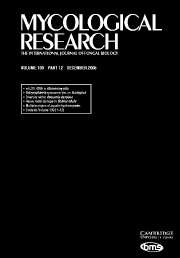Crossref Citations
This article has been cited by the following publications. This list is generated based on data provided by
Crossref.
Leus, L.
Dewitte, A.
Van Huylenbroeck, J.
Vanhoutte, N.
Van Bockstaele, E.
and
Höfte, M.
2006.
Podosphaera pannosa (syn. Sphaerotheca pannosa) on Rosa and Prunus spp.: Characterization of Pathotypes by Differential Plant Reactions and ITS Sequences.
Journal of Phytopathology,
Vol. 154,
Issue. 1,
p.
23.
Narayanasamy, P.
2008.
Molecular Biology in Plant Pathogenesis and Disease Management.
p.
159.
Glawe, Dean A.
2008.
The Powdery Mildews: A Review of the World's Most Familiar (Yet Poorly Known) Plant Pathogens.
Annual Review of Phytopathology,
Vol. 46,
Issue. 1,
p.
27.
Baiswar, P.
Chandra, S.
Patel, R. K.
and
Ngachan, S. V.
2009.
First report of powdery mildew on Prunus nepalensis in India.
Australasian Plant Disease Notes,
Vol. 4,
Issue. 1,
p.
131.
Kovács, Gábor M.
Jankovics, Tünde
and
Kiss, Levente
2011.
Variation in the nrDNA ITS sequences of some powdery mildew species: do routine molecular identification procedures hide valuable information?.
European Journal of Plant Pathology,
Vol. 131,
Issue. 1,
p.
135.
Jankovics, Tünde
Dolovac, Nenad
Bulajić, Aleksandra
Krstić, Branka
Pascal, Thierry
Bardin, Marc
Nicot, Philippe C.
and
Kiss, Levente
2011.
Peach Rusty Spot Is Caused by the Apple Powdery Mildew Fungus, Podosphaera leucotricha.
Plant Disease,
Vol. 95,
Issue. 6,
p.
719.
Lee, Seong-Chan
Han, Kyung-Sook
Cho, Sung-Eun
Park, Ji-Hyun
and
Shin, Hyeon-Dong
2012.
Occurrence of Powdery Mildew of Japanese Plum Caused by Podosphaera tridactyla in Korea.
Research in Plant Disease,
Vol. 18,
Issue. 1,
p.
49.
Meeboon, Jamjan
and
Takamatsu, Susumu
2015.
Notes on powdery mildews (Erysiphales) in Japan: III. Golovinomyces and Podosphaera.
Mycoscience,
Vol. 56,
Issue. 3,
p.
243.
Przyboś, Ewa
Tarcz, Sebastian
Rautian, Maria
and
Sawka, Natalia
2015.
Delimiting Species Boundaries within a Paraphyletic Species Complex: Insights from Morphological, Genetic, and Molecular Data on Paramecium sonneborni (Paramecium aurelia species complex, Ciliophora, Protozoa).
Protist,
Vol. 166,
Issue. 4,
p.
438.
Choi, I. Y.
Nam, E. Y.
Cho, S. E.
Park, J. H.
and
Shin, H. D.
2015.
First Report of Powdery Mildew Caused by Podosphaera tridactyla on Sweet Cherry in Korea.
Plant Disease,
Vol. 99,
Issue. 11,
p.
1648.
Pastirčáková, Katarína
Jankovics, Tünde
Komáromi, Judit
Pintye, Alexandra
and
Pastirčák, Martin
2016.
Genetic diversity and host range of powdery mildews on Papaveraceae.
Mycological Progress,
Vol. 15,
Issue. 4,
Fonseca, Natália R.
Guimarães, Lúcio M. S.
Pires, Raul P.
Klopfenstein, Ned B.
and
Alfenas, Acelino C.
2017.
Eucalypt powdery mildew caused by Podosphaera pannosa in Brazil.
Tropical Plant Pathology,
Vol. 42,
Issue. 4,
p.
261.
Swamy, Prashant
Probst, Claudia
and
Grove, Gary G.
2019.
Incidence of Podosphaera clandestina on sweet cherries (Prunus avium) and the influence of postharvest handling practices on the survival of conidia on harvested fruit.
Postharvest Biology and Technology,
Vol. 156,
Issue. ,
p.
110929.
Jeon, C. H.
Kang, S. H.
Choi, W. I.
and
Shin, H. D.
2019.
First Report of Powdery Mildew Caused by Podosphaera tridactyla on Prunus davidiana in Korea.
Plant Disease,
Vol. 103,
Issue. 1,
p.
158.
Kiss, Levente
Vaghefi, Niloofar
Bransgrove, Kaylene
Dearnaley, John D. W.
Takamatsu, Susumu
Tan, Yu Pei
Marston, Craig
Liu, Shu-Yan
Jin, Dan-Ni
Adorada, Dante L.
Bailey, Jordan
Cabrera de Álvarez, Maria Graciela
Daly, Andrew
Dirchwolf, Pamela Maia
Jones, Lynne
Nguyen, Thuan Dat
Edwards, Jacqueline
Ho, Wellcome
Kelly, Lisa
Mintoff, Sharl J. L.
Morrison, Jennifer
Németh, Márk Z.
Perkins, Sandy
Shivas, Roger G.
Smith, Reannon
Stuart, Kara
Southwell, Ronald
Turaganivalu, Unaisi
Váczy, Kálmán Zoltán
Blommestein, Annie Van
Wright, Dominie
Young, Anthony
and
Braun, Uwe
2020.
Australia: A Continent Without Native Powdery Mildews? The First Comprehensive Catalog Indicates Recent Introductions and Multiple Host Range Expansion Events, and Leads to the Re-discovery of Salmonomyces as a New Lineage of the Erysiphales.
Frontiers in Microbiology,
Vol. 11,
Issue. ,
Meeboon, Jamjan
Takamatsu, Susumu
and
Braun, Uwe
2020.
Morphophylogenetic analyses revealed that Podosphaera tridactyla constitutes a species complex.
Mycologia,
Vol. 112,
Issue. 2,
p.
244.
Kinosian, Sylvia P.
Pearse, William D.
and
Wolf, Paul G.
2020.
Cryptic diversity in the model fern genus Ceratopteris (Pteridaceae).
Molecular Phylogenetics and Evolution,
Vol. 152,
Issue. ,
p.
106938.
Lücking, Robert
Aime, M. Catherine
Robbertse, Barbara
Miller, Andrew N.
Ariyawansa, Hiran A.
Aoki, Takayuki
Cardinali, Gianluigi
Crous, Pedro W.
Druzhinina, Irina S.
Geiser, David M.
Hawksworth, David L.
Hyde, Kevin D.
Irinyi, Laszlo
Jeewon, Rajesh
Johnston, Peter R.
Kirk, Paul M.
Malosso, Elaine
May, Tom W.
Meyer, Wieland
Öpik, Maarja
Robert, Vincent
Stadler, Marc
Thines, Marco
Vu, Duong
Yurkov, Andrey M.
Zhang, Ning
and
Schoch, Conrad L.
2020.
Unambiguous identification of fungi: where do we stand and how accurate and precise is fungal DNA barcoding?.
IMA Fungus,
Vol. 11,
Issue. 1,
Marimon, Neus
Eduardo, Iban
León, Maela
Berbegal, Mónica
Armengol, Josep
and
Luque, Jordi
2020.
A qPCR-based method for the detection and quantification of the peach powdery mildew (Podosphaera pannosa) in epidemiological studies.
European Journal of Plant Pathology,
Vol. 158,
Issue. 4,
p.
1005.
Smith, Reannon L.
May, Tom W.
Kaur, Jatinder
Sawbridge, Tim I.
Mann, Ross C.
Pascoe, Ian G.
and
Edwards, Jacqueline
2021.
Re-Evaluation of the Podosphaera tridactyla Species Complex in Australia.
Journal of Fungi,
Vol. 7,
Issue. 3,
p.
171.




